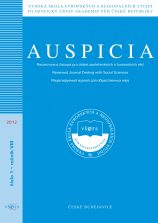Alexis de Tocqueville: demokracie v americe jako předobraz nové společnosti (s poukazem na recepci v českém myšlení – T. G. Masaryk, Lev Thun)
Alexis de Tocqueville: Democracy in America as Model of New Society (and Its Influence on Some Aspects of Czech Philosophy – T. G. Masaryk, Lev Thun)
Author(s): Jan SvobodaSubject(s): History of Philosophy, Political Philosophy, 19th Century Philosophy
Published by: Vysoká škola evropských a regionálních studií, z. ú.
Keywords: Alexis de Tocqueville; democracy in America; French Revolution; manners; equality; democratic despotism; new religion; T. G. Masaryk; Lev Thun;
Summary/Abstract: Alexis de Tocqueville analyses in his work Democracy in America (volume I: 1835, volume II: 1840) the crisis in Europe after the French Revolution in relation to a kind of democracy functioning in the United States. He believes that the Revolution was not an arbitrary historical event. It was the necessary outcome of the general continuous effort of social development towards the social equality. As the most important factor that creates the awareness of equality and keeps the successful functioning of democratic republic in the United States Tocquevill considers the specific social behaviour – manners. Original social units or norms of thinking and behaviour emerged from a long-standing development base in the connection of the theory with the practice. Social behaviour and habits are not the only force driving the spontaneous social dynamics which comes from the natural human ability to come and join together. For the democratic principle the natural social dynamics is implicit: the idea of social conditions equality. Furthermore, Tocqueville warns us that democracy can be endangered by democratic despotism. The first Tocqueville’s critical reflection of the democratic society focuses on the problem of urging justice, the second one is connected with the problem of social cohesiveness maintenance, the third one with the tendency of democratic systems to the centralisation of power. The particular moral character of America is kept by religion. Tocqueville is convinced that every egalitarien society, which intends to govern, requires the natural moral discipline anchored in the consciousness of every individual. This conscious submitting of one’s own will to the higher will is not enforced by the fear of punishment. It is the free-will consciousness where freedom meets the „Democratic and Republican“ Christianity of the New World. The priority of irreplaceable role of the religious moral influence in relation to individual and the whole society reminds us of thinking and effort of the Czech philosopher, sociologist, politician and statesman, the first president of the Czechoslovak Republic and successor of Franz Brentano Tomáš Garrigue Masaryk. I should remark that Tocqueville inspired also a significant Czech nobleman, politician and school reformer Lev Thun (1811-1888).
Journal: Auspicia
- Issue Year: 2015
- Issue No: 3-4
- Page Range: 171-185
- Page Count: 15
- Language: Czech

